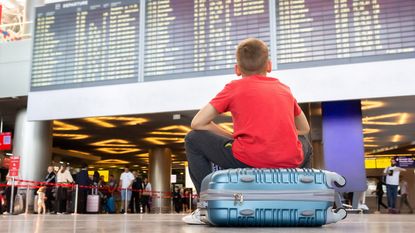The Five Biggest Travel Mistakes and How to Avoid Them
Here are the biggest travel mistakes people make. Whether it's forgetting travel insurance or paying unnecessary luggage fees, here's how to avoid them.


Even the most seasoned tourists can make travel mistakes when planning a vacation. Some blunders can be minor infractions, but others can cost travelers a lot of money and heartache.
But there are steps you can take to avoid travel mistakes. Here are six slip-ups that travelers may make this year, plus tips on how to avoid them.
1. Forgetting travel medical insurance
Christopher Elliott, a consumer advocate and founder of the nonprofit Elliott Advocacy, says many people don’t consider purchasing travel medical insurance. “People often think nothing bad will happen before or on their vacation, but then they get injured overseas and need to go to the hospital, and the next thing they’re looking at is a $10,000 hospital bill.” Indeed, nearly one in four Americans report they’ve experienced a medical issue while traveling abroad, according to a 2023 survey sponsored by GeoBlue, an international health insurance company.

Sign up for Kiplinger’s Free E-Newsletters
Profit and prosper with the best of expert advice on investing, taxes, retirement, personal finance and more - straight to your e-mail.
Profit and prosper with the best of expert advice - straight to your e-mail.
Unfortunately, most U.S. healthcare plans — including employer group plans, Medicare and Affordable Care Act plans — offer limited or no medical coverage outside the U.S.
How to avoid: One solution is to purchase a travel medical insurance policy, a type of insurance that provides coverage for a range of medical emergencies while traveling abroad, from minor injuries to major events like heart attacks and strokes, to medical evacuation and emergency transport in the case of severe emergencies.
The average travel medical insurance plan costs $89, according to Squaremouth, a travel insurance comparison website. Squaremouth advises international travelers to obtain a policy that provides a minimum of $50,000 in emergency medical coverage and at least $100,000 in medical evacuation coverage.
Note: Some travel insurance policies include emergency medical coverage and medical evacuation coverage up to certain limits.
Medication Tip: Follow our guide to international travel with medications. Even prescription drugs may be confiscated at the border.
2. Paying unnecessary luggage fees
You may have heard that a number of airlines — including American Airlines, Delta, and JetBlue Airways — recently raised their prices for checked bags. But one thing a lot of travelers aren’t aware of, Elliott says, is that some are now charging customers more if they check a bag at the airport versus paying to check a bag in advance. For instance, JetBlue customers flying within the U.S., Latin America, the Caribbean and Canada can save up to $20 on their first two checked bags ($10 savings per bag) when they add them to their flight reservation at least 24 hours before departure.
How to avoid: Make sure to pay ahead of time for any bags that you plan to check.
3. Getting hit by hidden hotel fees
Wi-Fi fees, early check-in fees, gym fees — hotels today charge guests no shortage of extra fees and surcharges. It’s a widespread problem: In an April 2023 survey by Consumer Reports, nearly four out of 10 (37%) U.S. adults said they had experienced a hidden or unexpected hotel fee in the previous two years.
How to avoid: Many hotels offer to reduce or, in some cases, waive certain fees to guests who join their loyalty program, which is free in most cases. Also, sometimes simply asking an employee at check-in to waive certain fees could do the trick.
4. Not factoring in Airbnb extra fees
Like hotels, Airbnb rental property owners often tack on extra fees, such as cleaning fees, fees for additional guests beyond a certain number, and service fees. These additional costs can add hundreds of dollars to your bill.
How to avoid: Elliott praised Airbnb for introducing a feature in December 2022 that allows guests to view a stay’s total costs, before taxes, when searching for rental properties. But he says there’s a caveat: “If you’re in the U.S., you need to change a setting in order to see the full rate when you search for rentals.”
To enable the feature, click the slider on the upper right of the search page that says, “Display total before taxes.”
5. Paying full price for car rentals
First, the good news: “The rental vehicle shortage has improved,” Elliott says. That’s resulted in a stabilization of rates, with rental car prices recently averaging $42 a day, up only 3% from last year, according to a report from the travel search company Hopper. The bad news? Renting a car is still more expensive than it was before the pandemic, especially for travelers who pay full freight.
How to avoid: There are several ways you can avoid paying full price. Big-box stores such as Costco, BJ’s and Sam’s Club provide their members discounts on certain rental cars. AARP and AAA also offer their members discounted rates.
- AARP members save up to 30% on base rates at Avis and Budget.
- AAA members save up to 20% on Hertz rentals.
- In addition, a number of credit card companies offer certain cardholders discounts when they book a vehicle from specific rental car companies.
You may also be able to nab a lower rate for your car rental by prepaying when you book a reservation. And, some rental car companies offer limited-mileage plans at a lower cost, which could be a good option if you’re planning to take just a short trip.
Tip: See if your credit card offers rental car insurance before you pay for insurance from a rental car company.
Related Content
Get Kiplinger Today newsletter — free
Profit and prosper with the best of Kiplinger's advice on investing, taxes, retirement, personal finance and much more. Delivered daily. Enter your email in the box and click Sign Me Up.

Daniel Bortz is a freelance writer based in Arlington, Va. His work has been published by The New York Times, The Washington Post, Consumer Reports, Newsweek, and Money magazine, among others.
-
 Stock Market Today: Dow Jumps 1,500 points on Election Outcome
Stock Market Today: Dow Jumps 1,500 points on Election OutcomeThe removal of election uncertainty unleashed a powerful rally in equity markets.
By Dan Burrows Published
-
 Federal Reserve Meeting: Updates and Commentary
Federal Reserve Meeting: Updates and CommentaryKiplinger experts provide commentary and analysis on the November Federal Reserve meeting.
By Kiplinger Staff Last updated
-
 Market Reaction to Election Results: What the Experts Are Saying
Market Reaction to Election Results: What the Experts Are SayingJobs Report Election uncertainty has been removed from the list of investors' worries, helping equities soar.
By Dan Burrows Published
-
 Are You an Estate Planning Procrastinator? Where to Start
Are You an Estate Planning Procrastinator? Where to StartQuit putting it off, because it's vital for you and your heirs. From wills and trusts to executors and taxes, here are some essential points to keep in mind.
By Alex Diaz, MBA, CFP® Published
-
 Write a Book in One Day and Become a Best-Selling Author!
Write a Book in One Day and Become a Best-Selling Author!If that sounds like a scam, that's because it is. Online publishing scams entice wannabe authors with big promises for a big price. How to protect yourself.
By H. Dennis Beaver, Esq. Published
-
 Election Poll Surprise Driven In Part by 65+ Female Voters
Election Poll Surprise Driven In Part by 65+ Female VotersJ. Ann Selzer pointed to voters aged 65+, and female voters in particular, as an explanation for the surprising presidential election poll results.
By Alexandra Svokos Published
-
 The Bare Necessities of Buying Pet Insurance
The Bare Necessities of Buying Pet InsurancePet insurance can help put you at ease over the health of your furry friends. Here's what to look for when shopping around for a policy.
By Joelle Spear, CFP® Published
-
 Five Options for Retirees Who No Longer Need Life Insurance
Five Options for Retirees Who No Longer Need Life InsuranceIf you're retired and you've checked with your financial planner that life insurance is no longer vital, here are five ways you can turn it to your advantage.
By Evan T. Beach, CFP®, AWMA® Published
-
 Amazon Prime Members Can Now Save Nearly $70 Per Year on Gas
Amazon Prime Members Can Now Save Nearly $70 Per Year on GasIf you’re an Amazon Prime member, you can now add discounts on fuel to your ever-expanding list of perks
By Kathryn Pomroy Published
-
 Financial Hangover Got You Down? Rebalance Your Budget
Financial Hangover Got You Down? Rebalance Your BudgetAfter overindulging on vacations or other fun, here's how to review your budget and set new goals, without sacrificing the experiences that matter most.
By Frank J. Legan Published